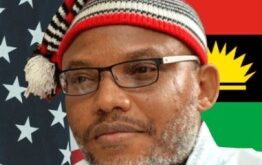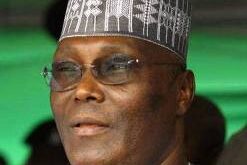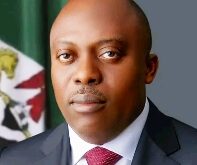
A flurry of activities enveloped politicking in Nigeria as primaries were conducted by various political parties in the country towards 2019. In the forefront of these enterprises were the All Progress Congress (APC), the People’s Democratic Party (PDP) and a motley crowd of loosed political parties either innate or ornate in making a mark in the political system.
Expectedly, the execution of these activities dovetailed to the key elements in the definition of the field of politics, which is the subjugation of the will of the collective, individually or otherwise by a person or a group towards attaining power.
This definition is crude but best described the understanding of the political process in Nigeria, which topography is a good fit for toxic politics. With 250 tribes, Nigeria is a heaven for venomous politics because one’s tribe and dialect presents a shield and a peep hole in which to view the world: the shield as a protection from the outside world and the hole to steal a look at the world.
Informed from the above, defining politics in Nigeria would mean a process in which chieftains or princes from 250 tribes and their followers hide behind their shields and steal a look through a hole at the world, which picture they see, define their perspective of society.
What this means interpretatively is that defining politics in the 250 dialects without or with an interpreter would naturally be toxic to the listener. Since politics is perceptions and value oriented, politicking by chieftains of the 250 tribes and their followers when they meet in the market place of ideas would naturally be frost with difficulties because people wants to hear only the things they love to hear.
The point in the dialectics of defining politics in Nigeria is that no one or tribe defines politics to hurt him/them because doing so is to shoot oneself on the foot. So what is the problem? The problem is consensus. It is the lack of consensus in the definition of various interests that create the noise, the infighting and dissensions by those who failed to grasp the meaning held by others; either by innate or inordinate fear or a deliberate refusal to accept the diversity in views held by others.
In all political dispensations in Nigeria, attempts have been made to reduce the inability of individuals in the 250 dialectic groups to understand why the other person thinks differently, with the creation of political parties in the country. The understanding in this reengineering is that members of the 250 dialectic groups in the country with similar orientation and beliefs would fuse into political parties and give birth to new communities to attain political goals.
But to what extent has this help in the understanding of how politics should be prospected in the country and what the reality is now. Before the first republic, Nigerians has just two dialectic groups: the colonialists and the colonized. People who lived at those times speak with nostalgia how a Fulani man from Sokoto would fight for his follow colonized from Arochukwu against a white man. Nigerians were united as one against British hegemonic rule. The sociology and psychology of the people was that Nigerians were collectively oppressed by the oppressor. The pain of one was the pain of all. It was best to think collectively than individually.
The success story of this thinking led to the liberation of the country in 1960 as one. Things would have been different had Nigerians expressed themselves ethnically the way we do now. I fear, Britain would have found it hard to grant Nigeria independence. From mere postulation, an independent Nigeria would have at least been 250 countries, discountenancing exaggerations! This fact is embedded in the psyche of Nigeria a few years after independence with the quest for regionalism, statism and outright secessionism by some groups in the new country.
The culprit in such thinking was the introduction of political parties going into the attainment of independence without first understanding the socio-psychology of the people. Political parties were created with the mirror of ethnic groupings in the country, perhaps with the exceptions of NCNC; which was conceived with the incorporation of British Western Cameroon. Western Cameroon left Nigeria following the plebiscite of 1961.
NCNC became an ethnic party following the victory of nationalists in the Cameroonian enclave largely because of the NCNC’s leadership feared that a victory by pro Nigeria politicians in Cameroon would distort ethnic configuration in the east. (This is an issue for another column). Had Western Cameroon remain with Nigeria, the bargaining political power of Eastern Nigeria would have been unimaginable.
The Fear that an ethnic group would dominate the other and render their selfish interest(s) irrelevant, the east conceded its future strength of bargaining power to the North and Western Nigeria; irrevocably. It cost Biafra the civil war and it cost Nigeria, the Bakassi peninsula, which either way one sees it.
It was toxic politics that destroyed the first republic and set it on a civil war and huge cost in administrative engineering to get this country going. The finger is pointed at the cross carpeting of the Action Group (AG) under the leadership of the sage, Chief Obafemi Awolowo, which allegedly used ethnicity to gain political power in Western Nigeria.
The pain of the great Zik would have simmer down had he stayed back to fight rather than jetting back to the east to fight for relevance. History speaks of the flurry of dissension when Zik came home from the West and how to give him relevance by his people tore the Eastern House to shreds. Since that episode, the East has never been the same. The East today thinks more ethnically than before the arrival of Zik from the West. The East was set for utopia as the preeminent hop of Nigeria’s economy and politics. What we hold on to in the East today is pretensions to the effect. We lost it and that glory would never be regained in this life!
The chain reactions to the episode involving the two nationalists in their quest to gain political advantage in Nigeria have been replicated in various forms since the First Republic. In the military regime, ethnicity was promoted as Federal Character in all spheres of politics. While it meets the exigencies in an autocratic system, as a policy, it is a misfit in a democracy as it promotes mediocrity, bad blood, rivalry and insipidity.
In the same vein, every state in Nigeria has been pluralized into ethnic groupings; even states with near monolithic ethnicity are not spared as family lines are being promoted as different from the other in the name of autonomous communities. Each ethnic group is on each other’s throat, touting their strong points over the weakness of the other; infesting the society with divisions instead of promoting diversity as a unifying factor of nation building.
Politics is not about where one comes from. Neither is it about heritage as promoted by the Obasanjo’s government and adopted by subsequent administration by appointing children of former office holders to political offices. Political appointment is not an inheritance to be passed over to the next in line after the father or spouse of a previous office holder has died. The promotion of this is toxic; an open wound to revolt or a seething resistance which may dovetail into criminality of all sorts in the society.
Interestingly, like amorphous birth, since 1999, Nigerian politicians have found that ethnicity is now old school and a new genre needs to be created for prospecting political power. This new genre is called political family of which, Member of this group aligned themselves to a cult like leader who allocates power to loyal acolytes. Obedience is tolerated while reason is abhorred. In these days of nay saying, erudite Nigerians who should think and live by example are heard saying: “the interest of the political family is supreme even if the action of the so called political leader goes against natural justice and the tenants of good follower-ship!
While political aggregation is veritable to politicking the turning of such aggregation into a weapon of control is what has infested the system to the detriment of political acculturation and good governance in Nigeria. Political family is mob life. Having obtained the oath of allegiance, political leaders in the name of one family; appropriates decision making to suit their political goals. Members are told to wait at the beck and call of the leader, who wouldn’t bat his eyes appointing his son in-law commissioner, his wife a senator, his brother in-law an ambassador and his sidekick his personal assistant!
In such an environment, members of the family given to reason often than not kicks or rebel against the family; those too awe to challenge the leader become veritable tools in the hands of the leader to chase or whip to order errant members. The extreme format for the discipline of the wayward in the family is to freeze such a member from the family. The member, out of the need for fresh air migrates to another political party to subsist. The reason for so many political parties in Nigeria is to provide fresh air from suffocating toxin in our political system for people with the mind to stand against tyranny.
Since 2003, when most politicians who felt caged by stifling leadership, defected to other parties in search of succor, it has been found that toxic politics also cross migrate along with them. Much too, when they are no longer together, members of the old family continuously poke at their former members, infesting their new homes with venom, the likes that even a black mamba would think twice before unleashing on his victim. Where this does not work or have little effect, his old family would employ weapons of strife and hunger on their errant member until he come to ruination or made to drive himself sad for them to gain victory.
Since 2011, the People’s Democratic Party and the All Progressive Congress are good examples of toxic politics in the country. Members of the family in the PDP, who were stifled by their political leaders, migrated to the APC and formed new family. They duplicated the old habit in PDP and unleashed on their new family in like manner the pain they felt in their old party. The old saying that you cannot teach a fox new trick holds for these two political parties. A fox is always a fox.
In all these it is the people that have been foxed in the political process bequeathed to Nigerians. Nigerians have been stripped of their rights to hold free thought, aspiration and freedom of association by the so called political family ethos. Politicians are choked to the point of asphyxiation because the political leader has not made up his mind. The mob like society they built has been acculturated into cultism, kidnapping gangs, murderous supporters and obscene spiritual association.
The political system has been infested with mafia occupation of political thought and reasoning; creating civil strife, communal alienation and maladministration through the tool of unleashing poverty of thought and belly on the people. So deadly is the toxin that political leaders, talk gleefully of stomach infrastructures and food on the table politics without shame. The shame of it all is to do nothing for the sake of having something to eat.
A man dies twice if he only lives to eat. Happy Christmas.
 PH Mundial – Port Harcourt Online Newspaper News Across The Region
PH Mundial – Port Harcourt Online Newspaper News Across The Region




